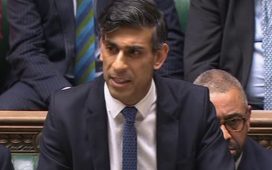
Media playback is unsupported on your device
It is too early to consider a strategy for exiting the coronavirus lockdown, the foreign secretary has said.
Dominic Raab said the current measures were “beginning to work” – but shifting focus could mean “we won’t get through the peak as fast as we need to”.
He added Boris Johnson remained in charge of the government from hospital, where the PM spent the night receiving treatment for coronavirus symptoms.
The number of virus hospital deaths in the UK now stands at 5,373.
The Department of Health and Social Care reported 51,608 confirmed cases.
Asked during the government’s daily briefing when the current social distancing measures could be lifted, the government’s chief medical adviser, Prof Chris Whitty, said it must first establish when the peak of the epidemic will come.
“The key thing is to get to the point where we are confident we have reached the peak, and [that] this is now beyond the peak,” he said.
“At that point, I think it [will be] possible to have a serious discussion about all the things we need to do, step by step, to move to the next phase of managing this.”
He added to start “having that discussion” before then would be a mistake.
It is the first time Prof Whitty has appeared at one of the briefings since spending time in self-isolation after he showed symptoms.
Deputy chief scientific adviser Prof Dame Angela McLean said it was “too early to tell” what the impact of the current measures would be.
“We need people to carry on following those instructions so we can work out, three weeks later, what actually happens in hospitals,” she said.
“We need to know how well the current restrictions are working before we can say anything sensible about what the next stage might be.”

Media playback is unsupported on your device
In a tweet on Monday, Mr Johnson said he was in “good spirits” after spending the night in St Thomas’ Hospital in London.
The prime minister, 55, tested positive for coronavirus 10 days ago.
He was taken to hospital on Sunday evening with “persistent symptoms” – including a temperature and a cough – for routine tests.
Asked whether it was appropriate for the prime minister to run the government from hospital, Mr Raab said Mr Johnson would “take the medical advice that he gets from his doctor”.
“We have a team…that is full throttle making sure that his directions and his instructions are being implemented,” he said.
He added he had not spoken to the prime minister since Saturday.
Prof Whitty said some of his own patients were “perfectly capable of managing massively complicated things” from their hospital beds, and confirmed that he had advised the prime minister to get tested.
Last month, the prime minister’s spokesman said if Mr Johnson was unwell and unable to work, Mr Raab, as the first secretary of state, would stand in.
US President Donald Trump is among those who has sent his wishes to Mr Johnson.
“All Americans are praying for him. He’s a great friend of mine, a great gentleman and a great leader,” Mr Trump said, adding that he was sure the prime minister would be fine because he is “a strong person”.
And Labour leader Sir Keir Starmer said he hoped the prime minister had a “speedy recovery”.
Meanwhile, the former head of the civil service Lord Kerslake said it may be “sensible” for Mr Johnson to “step back” if he is not well enough to carry out his role for now.
“I think in the end if he’s not well, he will have to reflect on this because the job’s tough at the best of times and it’s doubly tough now,” he told the BBC Radio 4’s Today programme.
Dr Sarah Jarvis, a GP and broadcaster, told the BBC that Mr Johnson would be likely to have his chest X-rayed and his lungs scanned, particularly if he had been struggling for breath.
She said he is also likely to have an electrocardiogram to check his heart’s function, as well as tests on his oxygen levels, white blood cell count, and liver and kidney function before he is released from hospital.
Mr Johnson has worked from home since it was announced that he had tested positive for coronavirus on 27 March.
He was last seen in public applauding the NHS and other key workers from his flat in Downing Street on Thursday evening, and chaired a coronavirus meeting remotely on Friday morning.
Later that day, the prime minister posted a Twitter video in which said he was still displaying minor symptoms.

Media playback is unsupported on your device
“I still have a temperature. So in accordance with government advice I must continue my self isolation until that symptom itself goes,” he said.
“But we’re working clearly the whole time on our programme to beat the virus.”
On Saturday, his pregnant partner Carrie Symonds tweeted that she had spent a week in bed with the main symptoms.
She said she had not been tested for the virus.
Health Secretary Matt Hancock had also tested positive for the virus and returned from self-isolation on Thursday to host the daily Downing Street news conference.
The government’s chief medical adviser, Prof Chris Whitty, self-isolated after showing symptoms but has now recovered and is back at work.
Tony Lloyd, Labour MP for Rochdale, has also been admitted to hospital for coronavirus treatment.
Sir Keir wished him a “swift and full recovery” on Twitter on Monday afternoon.
The news of Mr Johnson’s admission to hospital came shortly after the Queen delivered a rallying message to the nation, saying the UK “will succeed” in its fight against the coronavirus pandemic.
In a rare speech, the monarch thanked people for following government rules to stay at home and praised those “coming together to help others”.
In other developments:
- London’s emergency services are setting up specialist teams to handle Covid-19 deaths that do not happen in hospital
- No 10 said 27,000 former healthcare professionals have registered to return to the NHS
- Around 13% of police officers and support staff are currently off work, the president of the Police Superintendents’ Association of England and Wales has said
- Scotland’s chief medical officer has resigned after making two trips to her second home – despite government guidance urging people to avoid unnecessary travel
- The National Domestic Abuse helpline has seen a 25% increase in calls and online requests for help since the lockdown, the charity Refuge says
- High street pharmacists are “needlessly being put at risk” due to a lack of personal protective equipment (PPE), the Royal Pharmaceutical Society says
- Train drivers’ union Aslef is also calling for London Underground drivers to be provided with masks and gloves to protect them from contracting Covid-19
- Young workers and the worst paid are the most likely to be affected by the closure of businesses because of coronavirus, according to research by the Institute for Fiscal Studies
- The Open Championship has been cancelled for the first time since World War Two. It had been due to take place in July
How have you been affected by the issues relating to coronavirus? Share your experiences by emailing haveyoursay@bbc.co.uk.
Please include a contact number if you are willing to speak to a BBC journalist. You can also contact us in the following ways:













